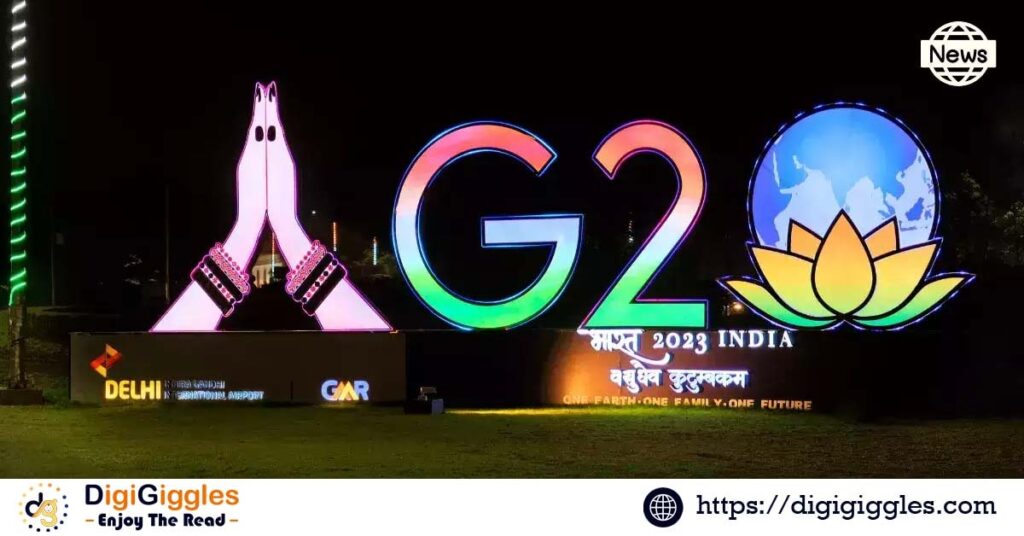New Delhi is preparing to showcase its vibrant side with walls adorned in colorful murals and graffiti, illuminated streets featuring prominent G20 billboards, and special arrangements in hotels and restaurants. From September 8 to September 10, the city will take the global spotlight as it welcomes world leaders for the G20 Summit. During this time, the most influential leaders from the world’s 20 largest economies will convene in the national capital to discuss critical global, economic, and geopolitical matters.
Here’s a concise overview of the G20 Summit set to unfold over the weekend:
The G20, also known as the Group of Twenty, encompasses 19 individual countries—Argentina, Australia, Brazil, Canada, China, France, Germany, India, Indonesia, Italy, Japan, Republic of Korea, Mexico, Russia, Saudi Arabia, South Africa, Turkey, United Kingdom, and the United States—alongside representation from the European Union.
Under India’s Presidency, New Delhi will host this significant G20 Summit, drawing the participation of prominent leaders. Over the upcoming three days, the city will welcome the likes of US President Joe Biden, Prime Minister of Britain Rishi Sunak, and Canadian Prime Minister Justin Trudeau, among others.
Confirmed attendees for the two-day summit include Argentine President Alberto Fernandez, Australian Prime Minister Anthony Albanese, Brazilian President Luiz Inacio Lula da Silva, French President Emmanuel Macron, German Chancellor Olaf Scholz, Indonesian President Joko Widodo, Italian Prime Minister Giorgia Meloni, Japanese Prime Minister Fumio Kishida, South African President Cyril Ramaphosa, Turkish President Recep Tayyip Erdogan, and Saudi Arabia Prime Minister Mohammed Bin Salman Al Saud.
Additionally, the event will feature the presence of Nigerian President Bola Ahmed Tinubu, African Union President Azali Assoumani, Bangladesh Prime Minister Sheikh Hasina, South Korean President Yoon Suk Yeol, Egyptian President Abdel Fattah El-Sisi, Chinese Premier Li Qiang, UAE President Sheikh Mohamed bin Zayed Al Nahyan, and Netherlands Prime Minister Mark Rutte.
What is this year’s theme?
The G20 theme of India is inspired by the Sanskrit saying “Vasudhaiva Kutumbakam,” which translates to “the world is a family.” According to the organizers, this theme is rooted in an ancient Sanskrit text. The phrase emphasizes the worth of all forms of life, including humans, animals, plants, and microorganisms, and underscores their interconnectedness on Earth and in the broader cosmos. In English, the theme is articulated as “One Earth, One Family, One Future.” Additionally, the event will place a strong emphasis on LiFE (Mission Lifestyle for Environment), advocating for choices that are both environmentally sustainable and responsible, as stated by the organizers.
The key issues during India’s year-long presidency of the G20 include:
- Increased Loans to Developing Nations: India has pushed for discussions on providing more financial assistance to developing countries from multilateral institutions. This reflects the concern for equitable economic development and recovery, especially in the wake of the COVID-19 pandemic.
- Reforming International Debt Architecture: The G20 is addressing the need to reform the international debt architecture. This involves examining how nations handle their debt obligations and finding ways to make the process fairer and more sustainable.
- Regulation of Cryptocurrency: The bloc is deliberating on the regulation of cryptocurrencies. This is likely in response to the growing popularity of digital currencies and the need to ensure they are properly regulated to prevent potential financial risks.
- Impact of Geopolitical Uncertainties on Food and Energy Security: The G20 is discussing how geopolitical uncertainties, such as conflicts and tensions among nations, can affect global food and energy security. This highlights the importance of ensuring stable access to essential resources.
However, it’s worth noting that the G20 has faced challenges in reaching consensus on certain issues, particularly concerning the war in Ukraine. While Western countries, including the United States, France, and Canada, have advocated for a strong condemnation of Russia’s role in the conflict, Russia and China have opposed blaming Moscow. This division has prevented the issuance of any joint statements on this matter so far this year.
